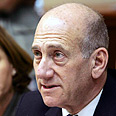The Second Lebanon War claimed the lives of 155 Israelis, 119 of them soldiers.
According to a spokesman at the Prime Minister's Office, Olmert is unable to attend the ceremony due to security concerns: "According to custom, the prime minister attends the annual Memorial Day state ceremony and the ceremony for the victims of terror. In other ceremonies, the government is usually represented by one of the prime minister's deputies.
"This is due to the many security arrangements involved in the prime minister's presence in such events, and following repeated incidents in recent years in which bereaved parents were forced to remain outside the ceremony because of security delays."
The spokesman added that "the prime minister respects the memory of those killed in the Second Lebanon War, and has met a different bereaved family each week over the last year."
Meanwhile, a spokesman for former defense minister Peretz explained that he was not invited to the ceremony since he was no longer a cabinet member.
"During his tenure as defense minister, Peretz participated in all events concerning the bereaved families and the Second Lebanon War. Peretz made vigorous efforts to promote the commemoration of the casualties of war... he completed all his obligations to the bereaved families…"
According to the spokesman, Peretz "cherishes and embraces the bereaved families, and will continue doing his utmost to ease their pain and commemorate the fallen in the most dignified manner."
Tamir: 'We sent those soldiers into battle'
President elect Shimon Peres also won't participate in the ceremony, despite having served as Vice Premier during the war. His office said in response that "the President elect has notified the bereaved families he will not be able to attend prior to taking office."
Other ministers who will not attend the service are: Internal Security Minister Avi Dichter (said he was not invited), Communications Minister Ariel Atias (said he was not invited), Justice Minister Daneil Friedmann (reason unclear), Environmental Protection Minister Gideon Ezra (said he was not invited), National Infrastructure Minister Benjamin Ben-Eliezer (on official State business in Georgia), Minister Yitzhak Cohen (decedents of the Cohen lineage are forbidden from entering cemeteries).
Education Minister Yuli Tamir called on her fellow cabinet members to make an effort to attend the ceremony. "We as government ministers are responsible for this war. For better or for worse. We are the ones who sent these soldiers into battle. I may have not received a formal invitation, but I have a responsibility to face these bereaved parents and children. I see this as a test of the solidarity of our values as ministers," said Tamir.
Ministers who will attend the service are: Defense Minister Ehud Barak, Foreign Affairs Minister Tzipi Livni, Industry, Trade, and Labor Minister Eli Yishai, Health Minister Yacov Ben Yizri, Education Minister Yuli Tamir, Immigration Minister Ze'ev Boim, Tourism Minister Yitzhak Aharonovitch, Transportation Minister Shaul Mofaz, Agriculture Minister Shalom Simhon and Minister Jacob Edery.
Former Minister Eitan Cabel, who resigned following the findings of the Winograd partial report regarding
the failings of the government during the war, said he would be in attendance.
Three ministers who preferred not to answer were Science, Culture and Sport Minister Raleb Majadele, Strategic Affairs Minister Avigdor Lieberman and Pensioner's Affairs Minister Rafi Eitan.

















